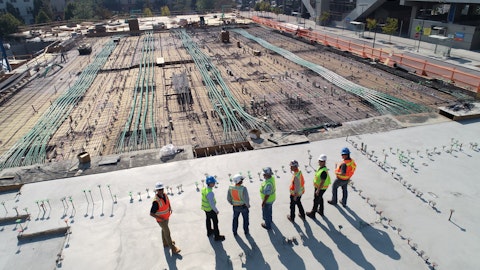CBRE Group, Inc. (NYSE:CBRE) Q4 2022 Earnings Call Transcript February 23, 2023
Operator: Greetings and welcome to the CBRE Q4 2022 earnings conference call. At this time, all participants are in a listen-only mode. A brief question and answer session will follow the formal presentation. If anyone should require Operator assistance during the conference, please press star, zero on your telephone keypad. As a reminder, this conference is being recorded. It is now my pleasure to introduce your host, Brad Burke, Senior Vice President of Investor Relations and Strategic Finance at CBRE. Thank you, you may begin.
Brad Burke: Good morning everyone and welcome to CBRE’s fourth quarter 2022 earnings conference call. Earlier today, we posted a presentation deck on our website that you can use to follow along with our prepared remarks, and an Excel file that contains additional supplemental materials. Before we kick off today’s call, I’ll remind you that today’s presentation contains forward-looking statements, including without limitation statements concerning our earnings outlook. Forward-looking statements are predictions, projections, or other statements about future events. These statements involve risks and uncertainties that may cause actual results and trends to differ materially from those projected. For a full discussion of the risks and other factors that may impact these forward-looking statements, please refer to this morning’s earnings release and our SEC filings.
We have provided reconciliations of the non-GAAP financial measures discussed on our call to the most directly comparable GAAP measures, together with explanations of these measures in our presentation deck appendix. I’m joined on today’s call by Bob Sulentic, our President and CEO, and Emma Giamartino, our Chief Financial Officer. Now please turn to Slide 5 as I turn the call over to Bob.
Bob Sulentic: Thank you Brad, and good morning everyone. As you’ve seen, we reported core EPS of $1.33 for the fourth quarter. While down significantly from a year ago, core earnings were slightly above the estimate we provided at the end of the third quarter. This outcome was driven by several of the more cyclically resilient elements of our business, like outsourcing and others that are secularly favored, like project management and the logistics asset class. These businesses, which together comprise about 45% of our core EBITDA, grew revenue more than we expected, offset by a slightly larger than expected decline in transactional revenue. Full year core EPS grew 7% to $5.69. This is a solid growth rate considering the more than doubling of long term interest rates, sharp equity market decline, and the credit crunch that constrained investment activity for most of the second half.
Notably, we ended 2022 with virtually no leverage despite making share repurchases, infill M&A, and strategic investments that together totaled approximately $2.1 billion during the year. Looking at the macro environment, cap rates are up 100 to 150 basis points, perhaps a bit more for office, and we expect them to expand another 25 basis points or so before peaking, likely in Q2. While capital largely remains on the sidelines, we are beginning to see signs of asset re-pricing helped along by the narrowing of spreads. Among property types, multi-family and industrial fundamentals should remain strong, albeit with occupancy declining slightly from peak levels and rent growth continuing at a more modest clip than the double-digit pace set in 2022.
Office will remain the most challenged property type as we do not expect occupancy to come close to pre-pandemic levels in the short term. Globally, we expect significant sales and leasing weakness in the first half before adverse conditions begin to ease later in 2023. Relative to 2022, we expect both Europe and Asia Pacific to outperform the Americas this year. For 2023, we expect core EPS to decline by low to mid double digits but still to be the third highest in CBRE’s history. As we’ve pointed out before, this would be a meaningfully better performance than in prior recessions, such as the global financial crisis when core EPS decreased more than 60%. In all, 2023 will be a transition year and we feel good about where we’ll be when we get to the other side of the downturn.
While the macro environment can certainly change, we expect core EPS to grow strongly in 2024, exceeding the 2022 peak and reaching a record level in just the first year after a recession. With that, I’ll hand the call to Emma, who will discuss our quarter and our outlook in greater detail. Emma?
Emma Giamartino: Thank you Bob. Before turning to our 2023 outlook, I’ll first discuss fourth quarter results for each of our segments, starting with advisory on Slide 6. Advisory net revenue and SOPs declined by 21% and 33% respectively, driven by a slightly more pronounced decline in our higher margin transactional businesses than originally expected which was partially offset by healthy growth from our property management business. For capital markets, sales and mortgage origination combined revenue declined by 46%, in line with our expectations. Capital markets revenue growth was robust in last year’s Q4, increasing by 53%, which accentuated the extent of this year’s decline. Leasing revenue was down 7% both globally and in the Americas, a slightly bigger decline than we expected with a notable slowdown in office activity in New York, Boston, San Francisco and Seattle.

Photo by Bernadette Gatsby on Unsplash
In total, global office leasing revenue was 14% below prior year after increasing by nearly 50% year to date through the third quarter, albeit against relatively easy prior year comparisons. Outside the U.S., leasing revenue was down 6% wholly due to FX translation headwinds. In local currency, lease revenue increased in both EMEA and Asia Pacific. The 19% decline in loan servicing was attributable to fewer prepayments amid rising mortgage rates versus record prepayments in Q4 2021. Excluding prepayments, loan servicing revenue increased by 2%. Overall cost in advisory declined by 18%, but this was not enough to offset the 21% decrease in total new revenue. Turning to Slide 7, GWS net revenue grew by 13% with half of that increase coming from organic revenue growth.
In local currency, net revenue excluding Turner & Townsend increased by 12% with facilities management up 9% and project management up 21%. GWS SOP increased by 30% with margin improvement driven partly by business mix. Turner & Townsend continued to grow impressively. In the first full year since acquiring a 60% interest, Turner & Townsend has exceeded our original underwriting. 2022 represented our highest ever year for client contracts coming up for renewal, totaling over $4 billion. GWS renewed 94% of this total, often with increased scope of our client relationships. Looking forward, we expect 2023 renewals to be just over half the level of 2022. The GWS revenue pipeline ended the year up 11% over year-end 2021, reflecting continued demand from first generation and outsourcing clients as well as expansion mandates from our existing client base.
Turning to Slide 8, REI SOP declined to just $17 million in Q4 against an unusually strong prior year comparison. Our global development business posted a $6 million SOP loss primarily due to a $43 million loss in our Telford, U.K. development business. Lower SOP in U.S. development reflects the timing of assets dispositions, which were heavily weighted to this year’s first half, consistent with our expectations going into the year. Following an in-depth review of the Telford business, we wrote down a handful of projects where we expect costs to exceed our initial underwriting, and we also increased our fire safety reserve. We now believe Telford financial performance will improve going forward. Investment management AUM grew $5 billion sequentially, driven by net capital inflows of $4 billion and positive FX movements which offset $5 billion of mark-to-market declines.
Investment management SOPs declined due in part to co-investment losses versus a gain in the prior year quarter. Excluding co-investment gains and losses, investment management SOP was nearly flat with the prior year quarter. Turning to Slide 9, our 2023 outlook is underpinned by the following macroeconomic assumptions. The U.S. will experience a short, moderate recession in 2023, unemployment will increase to near 5%, inflation will end the year above the Fed’s 2% target but clearly trending down, and 10-year U.S. treasury yields will end the year under 3.5%. Should the economic outlook change from this base case, our business outlook would also change. In our advisory segment, we expect a mid single digit revenue decline. This will be driven by growth in more resilient lines of business offset by a mid to high single digit decline in leasing and mid-teens decline in property sales.
We expect SOP to decline by high single digits to low double digits as cost savings initiatives partially offset both relatively better growth in lower margin businesses and general cost inflation. In our property sales business, we expect the number of transactions will be subdued in the first half of the year and accelerate in the back half of the year. We expect our leasing business to continue to benefit from an elevated level of lease expirations. While the return to office has been slow in the U.S., EMEA and APAC have seen occupancy return at a faster pace. As a result, we expect these regions to be less pressed than the Americas in 2023. For property management and valuations, we expect accelerating revenue growth in both kinds of business due to recent investments in sales support and tuck-in acquisitions, as well as less FX pressure.
Within GWS, we expect low double digit new revenue and SOP growth with margins increasing slightly as cost savings more than offset inflation and incremental investment to support growth. Our facilities management business is benefiting from new wins and expansions. All major client sectors are expected to grow, notably in healthcare and technology where the changing use of real estate is driving increased demand for outsourcing services that we believe CBRE is best positioned to deliver. We also expect continued momentum in our project management businesses, including double digit top and bottom line growth from our Turner & Townsend business. Within our REI segment, we expect SOP in the mid $300 million range with roughly equal contributions from development and investment management.
Within our TCC development business, we expect SOP of just over 1% of our nearly $17 billion in-process portfolio, and we’ve closed over $100 million of expected SOP in January alone. Our TCC business has developed a portfolio of assets that we believe is extremely well positioned for the current market environment with approximately 75% of our expected SOP in 2023 from industrial deals. While our Telford business remains challenged, we do expect improvement versus 2022 as significant cost inflation is now incorporated into projected results, adding approximately $20 million to SOP versus 2022. Beyond our three main business segments, we also expect roughly flat corporate overhead and our full year core tax rate to rise to 2021 levels versus a lower 2022 rate.
Consistent with our approach last year, the 2023 outlook assumes only a modest use of capital. That said, we continue to have a strong appetite for M&A and share repurchase, both of which could support incremental earnings growth above our current outlook, and we do not anticipate ending 2023 in a net cash position. In summary, we expect core EBITDA to decline by high single digits versus 2022 with over half attributable to the decline in development SOP. We expect core EPS to decline by low to mid double digits versus 2022. This is more than the core EBITDA decline because of higher depreciation and amortization and a higher tax rate than in 2022, when we had a number of one-time benefits that will not recur. Lastly, we expect nearly two-thirds of full year core EPS in the back half of the year, a more pronounced seasonality to earnings than we historically experienced.
The $400 million cost containment program we announced last quarter is embedded in our guidance. Fourth quarter results saw a nearly $80 million cost benefit and we expect a cost benefit in 2023 of approximately $300 million, with the remainder in 2024. The entirety of the cost containment program will be reflected in our run rate by the end of this year. We expect that our cost containment efforts will allow us to counteract the general inflation pressures and enable us to make continued investments to support future growth. Last year, we refreshed our 2025 financial guidance which implied CBRE would achieve core EPS between $8 and $9 by year-end 2025, absent meaningful capital allocation. Due to the real estate transaction downturn, our target is now likely to slip by 12 to 18 months.
As I noted previously, our 2025 targets were established on the basis that there would not be a recession following the COVID recovery. The drivers of how we achieve this core EPS growth are largely unchanged. At the midpoint of that core EPS target, $8.50, CBRE will have achieved double digit compound core EPS growth since 2019 despite needing to manage through two significant downturns. It also represents a high teens CAGR from our 2023 projection. In closing, we remain excited about CBRE’s prospects for long term growth, the strength of our brand, and our ability to outperform during periods of market weakness. With that, Operator, we’ll open the line for questions.
See also 10 High Growth Micro-cap Stocks to Buy and 10 Best Stocks to Buy For the Next 3 Months.
Q&A Session
Follow Cbre Group Inc. (NYSE:CBRE)
Follow Cbre Group Inc. (NYSE:CBRE)
Receive real-time insider trading and news alerts
Operator: Thank you. We will now be conducting a question and answer session. Our first question is from the line of Anthony Paolone with JP Morgan. Please go ahead.
Anthony Paolone: Thank you and good morning. My first question relates to GWS and the outsourcing business, and I was wondering if you can maybe take us inside that business a bit more and help us understand how in an environment where office usage is down and footprints are shrinking, that that business can continue to grow. Just would like to better understand what additional services clients are taking on to maybe offset smaller footprints.
Bob Sulentic: Tony, first of all, even if the work you do for a client in a specific portion of their portfolio is shrinking, it likely would result in project management work, potentially transaction management work, portfolio management work, so even if you have some shrinkage within an account, there are opportunities for revenue. But secondly, there is the addition of new accounts which has been very significant for us for the past year, actually record levels, and we’re expecting that going forward, where people are giving us more property to manage because they want to save cost, so the combination of those factors has allowed us to grow that business consistently over the years during downturns, and we expect it’s going to be a double-digit grower in 2023 for the same reasons.
Anthony Paolone: Okay, and then just my second question relates to just perhaps any color you can give us that you’re seeing on the ground today in terms of either greenshoots or regions or property types where you’re starting to see activity levels rebound. I think you alluded to some properties starting to come to market or folks maybe testing the market a bit, and so just wonder if you could elaborate on that some.
Bob Sulentic: Yes, and you’re asking with regard to property sales?
Anthony Paolone: And leasing, just the more transactional stuff.
Bob Sulentic: Yes, okay. Well, where we’re seeing activity in sales is for good assets, even in some cases office assets if they’re Class A buildings, fully leased, but for sure industrial and multi-family. If you went back to last year, even the end of last year, you would get a couple bidders that would test the waters, but now for some of the better quality assets, we’re getting several bidders and they’re bidding aggressively, and there’s anecdotes on multi-family, there’s anecdotes on industrial in particular where we’re seeing that happen. It’s quite a bit different than it was last year. There is a lot of capital that’s been on the sidelines wanting to acquire assets. There’s a lot of asset owners that have wanted to sell assets, and we’re starting to see spreads come in a little bit now and the buyers get a little more aggressive in various cases, so that’s what you’re seeing there.
With leasing, we continue to see very strong fundamentals in industrial. There is low vacancy, there are a lot of companies out there that still need space for a variety of reasons, and so we are seeing momentum there, and then you have, as we said before, you have a considerable amount of renewal activity around office buildings and retail in particular.
Anthony Paolone: Okay, thank you.
Operator: Thank you. Our next question is from the line of Chandni Luthra with Goldman Sachs. Please go ahead.
Chandni Luthra: Hi, good morning. Thank you for taking my questions. Bob, you talked about 2024 EPS recovering to 2022 levels at least. What gives you confidence on such a recovery, just given the macro environment and the uncertain outlook that we all have at the moment for the rest of the year? Are you seeing any signs on the ground of improvement, anything that gives you that confidence to go out and talk about 2024 right now?





